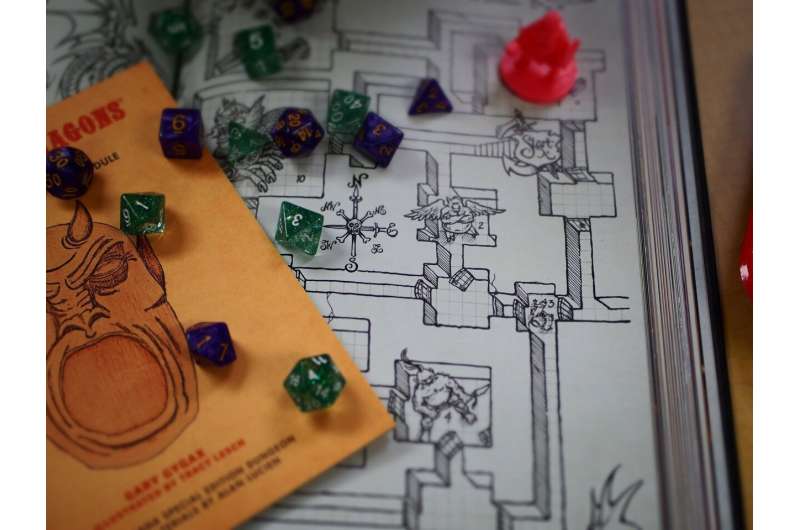This article has been reviewed according to Science X's editorial process and policies. Editors have highlighted the following attributes while ensuring the content's credibility:
fact-checked
trusted source
proofread
Playing Dungeons and Dragons can support mental health

Playing Dungeons and Dragons can positively support players' mental health, a new study finds. Conducted by researchers at University College Cork (UCC), the findings pave the way for clinicians and psychologists to further explore the benefits of the game as a therapeutic tool.
Dungeons and Dragons—or D&D—is a fantasy tabletop role-playing game that has evolved to become a global phenomenon. Playing Dungeons and Dragons is an inherently social activity, requiring frequent group meetings for a period of months or years, and requiring creativity and collaboration from players.
After the game experienced a surge in popularity during the COVID-19 pandemic, this study investigated the impact of playing D&D on the mental health of frequent players. It identified several key aspects that supported positive mental health, including escapism, exploration of self, creative expression, providing for others, social support and routine.
The study is published in the International Journal of Role-Playing.
Feeling in control
Orla Walsh, study lead and Ph.D. researcher in UCC School of Applied Psychology, said, "Our research found that players discussed the benefits of escapism that accompanied playing D&D, and the positive impact that this had on their mental health.
"Players reported feeling a strong sense of control in-game during times when they felt they did not have control outside of the game. While many hobbies may allow for creative expression, D&D uniquely allows players to collaboratively build and inhabit worlds of their creation."
"The social support nurtured by playing D&D gives players emotional and social connection and offers them a space in which they can express themselves freely. While social support is a recognized benefit of many group activities, the collaborative storytelling aspect of D&D fosters a unique sense of camaraderie and shared experience among players," Orla said.
Use of role-playing games in therapy
The study indicates that D&D has significant potential to be utilized in a therapeutic setting, as players felt more comfortable exploring problems and practicing skills in a space that was separate from the real-world. Study participants reported benefits in everyday lives from playing the game, including increased sense of autonomy and personal growth.
The findings allow psychology researchers to understand better the mechanisms through which this activity can have positive impact, while providing encouragement for clinicians already using D&D groups as social well-being supports.
Dr. Conor Linehan, UCC School of Applied Psychology, said, "This study found that D&D can bring a myriad of benefits for players. Although there are some clinicians and community groups that currently use role playing games therapeutically, those groups are predominantly active in the United States.
"Our study suggests that a wider rolling out of such therapeutic role playing groups may be of benefit in Ireland and across the globe, offering the great potential to support skills development, emotional exploration, problem solving and foster meaningful social connection."
"The findings of this study have the potential to enhance our understanding of why D&D has proven successful in therapeutic settings. It provides a foundation for understanding how the game might be used as a tool in the future," Dr. Linehan said.
More information: Orla Walsh et al, Roll for Insight: Understanding How the Experience of Playing Dungeons & Dragons Impacts the Mental Health of an Average Player, International Journal of Role-Playing (2024). DOI: 10.33063/ijrp.vi15.321




















